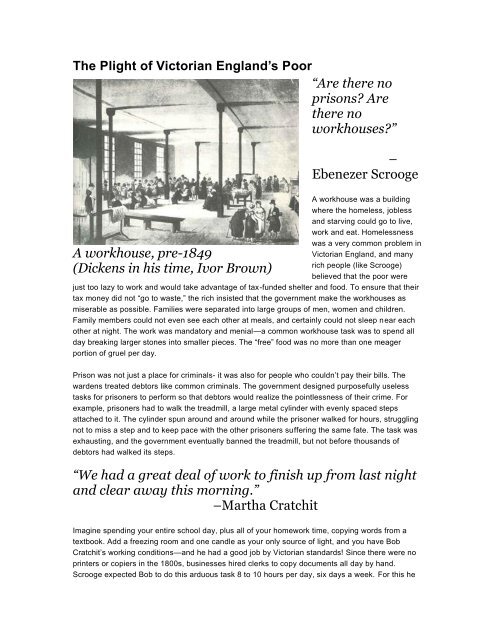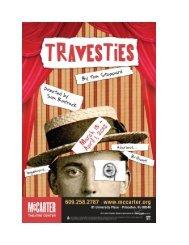Print Version - McCarter Theatre
Print Version - McCarter Theatre
Print Version - McCarter Theatre
You also want an ePaper? Increase the reach of your titles
YUMPU automatically turns print PDFs into web optimized ePapers that Google loves.
The Plight of Victorian England’s Poor<br />
“Are there no<br />
prisons? Are<br />
there no<br />
workhouses?”<br />
A workhouse, pre-1849<br />
(Dickens in his time, Ivor Brown)<br />
–<br />
Ebenezer Scrooge<br />
A workhouse was a building<br />
where the homeless, jobless<br />
and starving could go to live,<br />
work and eat. Homelessness<br />
was a very common problem in<br />
Victorian England, and many<br />
rich people (like Scrooge)<br />
believed that the poor were<br />
just too lazy to work and would take advantage of tax-funded shelter and food. To ensure that their<br />
tax money did not “go to waste,” the rich insisted that the government make the workhouses as<br />
miserable as possible. Families were separated into large groups of men, women and children.<br />
Family members could not even see each other at meals, and certainly could not sleep near each<br />
other at night. The work was mandatory and menial—a common workhouse task was to spend all<br />
day breaking larger stones into smaller pieces. The “free” food was no more than one meager<br />
portion of gruel per day.<br />
Prison was not just a place for criminals- it was also for people who couldn’t pay their bills. The<br />
wardens treated debtors like common criminals. The government designed purposefully useless<br />
tasks for prisoners to perform so that debtors would realize the pointlessness of their crime. For<br />
example, prisoners had to walk the treadmill, a large metal cylinder with evenly spaced steps<br />
attached to it. The cylinder spun around and around while the prisoner walked for hours, struggling<br />
not to miss a step and to keep pace with the other prisoners suffering the same fate. The task was<br />
exhausting, and the government eventually banned the treadmill, but not before thousands of<br />
debtors had walked its steps.<br />
“We had a great deal of work to finish up from last night<br />
and clear away this morning.”<br />
–Martha Cratchit<br />
Imagine spending your entire school day, plus all of your homework time, copying words from a<br />
textbook. Add a freezing room and one candle as your only source of light, and you have Bob<br />
Cratchit’s working conditions—and he had a good job by Victorian standards! Since there were no<br />
printers or copiers in the 1800s, businesses hired clerks to copy documents all day by hand.<br />
Scrooge expected Bob to do this arduous task 8 to 10 hours per day, six days a week. For this he



